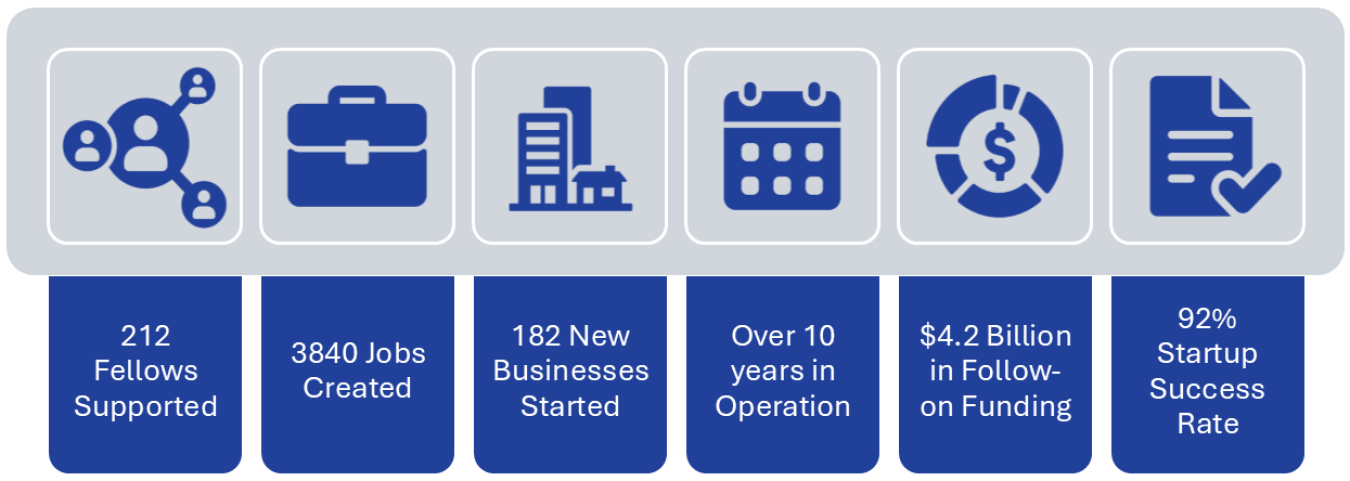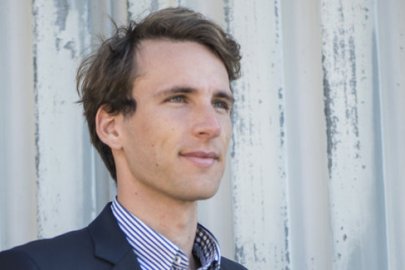What is LEEP?
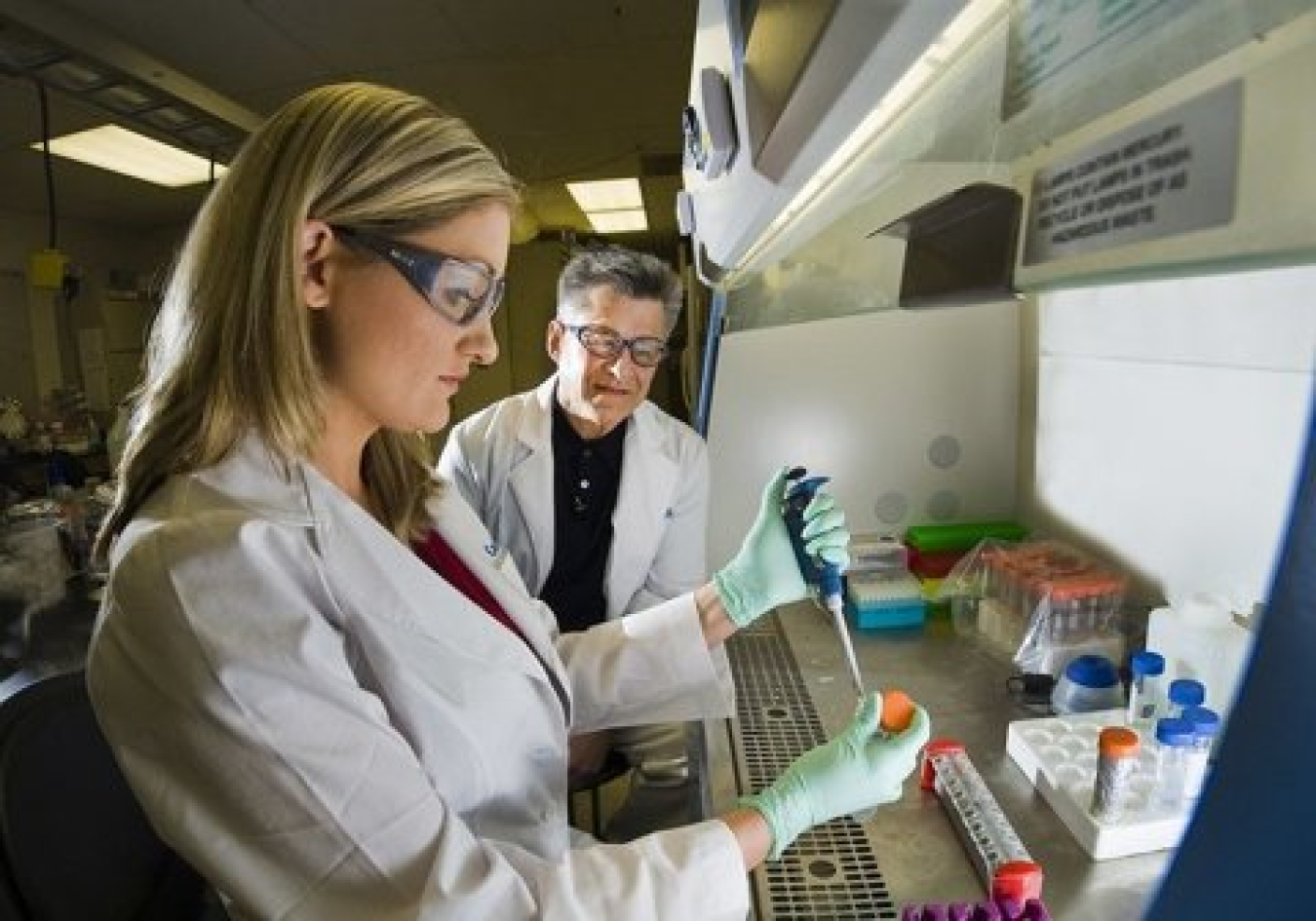
The U.S. Department of Energy's (DOE) Lab-Embedded Entrepreneurship Program (LEEP) recruits the best and brightest through a national call for a two-year funded fellowship. The primary purpose of this fellowship is to provide fellows who have early-stage energy startups and/or emerging technologies with the support needed to develop and transition their ideas into the market.
These entrepreneurs are embedded for a period of two years at one of four national labs where they are mentored by a lab scientist. In addition, LEEP also provides support at the local, regional, and national levels including entrepreneurship training and a networking ecosystem to eliminate the hurdles traditionally faced by early-stage energy and manufacturing technology startups.
What are the impacts of LEEP?
America is in critical need of new innovations that will be derived from massive U.S. investments in basic and applied energy and manufacturing research at universities and national energy labs. Only through the commercialization and resulting impact of these innovations will our nation be able to enhance the affordability, reliability, and security of the American energy economy.
By the Numbers
Learn About LEEP
LEEP’s mission is to enable the most promising entrepreneurs to develop game-changing technologies. New innovations, derived from U.S. investments in basic and applied energy research at universities and national labs, will enhance affordability, U.S. energy security, and domestic manufacturing competitiveness.
Calling all innovators with great tech-related ideas who are ready to take their technologies from concept to commercialization! This program was designed for early-stage small-business owners and entrepreneurs whose startups will benefit the American economy and accelerate the deployment of transformative energy and manufacturing technologies.
To be eligible to apply for LEEP, you must:
- Have a technical degree.*
- Have at least four or five years of technology R&D experience.*
- Be a U.S. citizen or lawful permanent resident at time of application and maintain legally authorization to work in the U.S. for the full duration of the two-year fellowship.
- Be willing to work on your project full-time and forfeit other primary employment during your fellowship.
- Not be currently enrolled in a Ph.D. or post-doctoral program at the start of the fellowship.
- Be willing and able to relocate to the metropolitan area of the national lab where you have been accepted.
- Reside in local proximity to the national lab for the full duration of the fellowship.
- Be a novice or first-time technical founder and not a serial entrepreneur.
- Apply as an individual; Group applications on behalf of a company or team are not supported.
*Specific eligibility requirements differ between the four LEEP nodes. Please refer to the specific webpage of each node for a full list of eligibility requirements and for differences therein.
LEEP's four programs or "nodes" offer participants direct access to the facilities of one of four national laboratories, along with the opportunity to work alongside scientists within those labs, while they work to develop their technological startups.
Participants receive funding from the DOE to address innovations in the following areas:
- Advanced materials
- Improving manufacturing efficiency
- Quantum computing
- Energy production technologies
- Energy storage and the electric grid
- Recovery, Reuse, and Recycling
- Other technologies that further the DOE's mission of ensuring America’s security and prosperity by addressing its energy and nuclear challenges.
Fellows receive:
- A paid personal living stipend for the full two-year duration of the program.
- Healthcare benefits and insurance coverage.
- A yearly travel allowance for LEEP-related purposes.
- Access to equipment and scientists at one of four national laboratories.
- Grant funding to use on collaborative R&D within the national lab where they are placed.
- Comprehensive mentoring assistance to build a sustainable business model.
- Speaking opportunities at DOE-sponsored events, including the annual LEEP Summit and LEEP Demo Day, both of which convene ecosystem partners and investors to learn about current LEEP startups and technologies.
How Do I Apply?
Participants can apply to one of the four LEEP nodes hosted at their respective DOE national laboratories:
- Chain Reaction Innovations program at Argonne National Laboratory in Lemont, Illinois
- Cyclotron Road program at Lawrence Berkeley National Laboratory in Berkeley, California
- Innovation Crossroads program at Oak Ridge National Laboratory in Oak Ridge, Tennessee
- Westgate program at NREL in Golden, Colorado
Who Are the Key Supporters and Partners?
Multiple offices within and outside of DOE fund innovators in the program working on technologies critical to their missions, and the LEEP nodes strengthen ties to their local and regional ecosystems through strategic partnerships.
- Office of Energy Efficiency and Renewable Energy
- Advanced Materials and Manufacturing Technologies Office (core funding office)
- Industrial Technologies Office
- Building Technologies Office
- Hydrogen and Fuel Cell Technologies Office
- Solar Energy Technologies Office
- Office of Fossil Energy and Carbon Management
- Carbon Management Technologies
- Office of Electricity
- Energy Storage
- Grid Controls and Communications
- Office of Science
- Advanced Scientific Computing Research
- Basic Energy Sciences
- Biological and Environmental Research
- Office of Energy Efficiency and Renewable Energy
- Activate (Cyclotron Road)
- Colorado School of Mines (West Gate)
- Tennessee Valley Authority (Innovation Crossroads)
Who Are the Current Participants?
2025 Cohort
Meet the 2025 cohort of 27 innovators selected at each node, announced July 14, 2025.
2024 Cohort
Meet the 33 innovators selected in the 2024 cohort at each node, announced July 10, 2024.
2023 Cohort
Who Has Participated and What Innovations Have They Made?
News
-
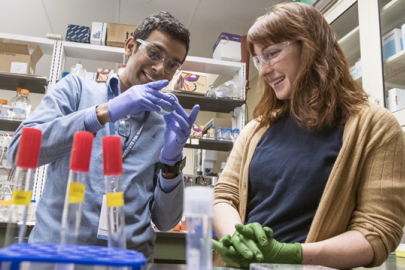 Visit national laboratory program websites for more information and to apply.September 4, 2024
Visit national laboratory program websites for more information and to apply.September 4, 2024 -
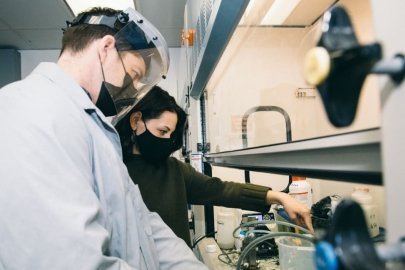 The webinar will present information on the LEEP Request for Information (RFI), encourage audience members to respond, and provide an opportunity to answer questions.August 27, 2024
The webinar will present information on the LEEP Request for Information (RFI), encourage audience members to respond, and provide an opportunity to answer questions.August 27, 2024 -
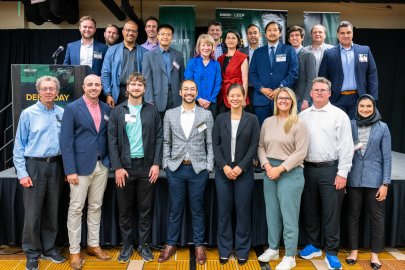 In the latest round of cohorts in its Lab-Embedded Entrepreneurship Program (LEEP), 33 innovators will be embedded across four U.S. national laboratories to work with an extensive network of mentors and experts.July 10, 2024
In the latest round of cohorts in its Lab-Embedded Entrepreneurship Program (LEEP), 33 innovators will be embedded across four U.S. national laboratories to work with an extensive network of mentors and experts.July 10, 2024 -
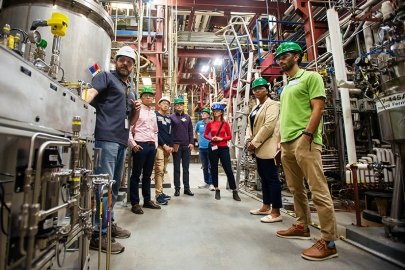 Today, the U.S. Department of Energy (DOE) announced the latest round of cohorts in its Lab-Embedded Entrepreneurship Program (LEEP).October 13, 2023
Today, the U.S. Department of Energy (DOE) announced the latest round of cohorts in its Lab-Embedded Entrepreneurship Program (LEEP).October 13, 2023 -
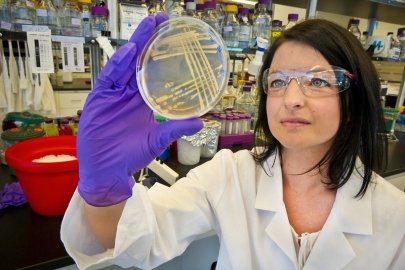 The Department of Energy's (DOE) Lab-Embedded Entrepreneurship Program has exceeded $1 billion in follow-on funding and investments raised by participating renewable energy startups since its inception in 2015.March 13, 2023
The Department of Energy's (DOE) Lab-Embedded Entrepreneurship Program has exceeded $1 billion in follow-on funding and investments raised by participating renewable energy startups since its inception in 2015.March 13, 2023 -
The U.S. Department of Energy announced the latest cohorts in its Lab-Embedded Entrepreneurship Programs.July 6, 2020
-
The 22 selected innovators will join an extensive network of mentors and experts at U.S. national laboratories.June 8, 2021
-
DOE announced the third cohort of innovators to join Chain Reaction Innovations, a DOE-funded entrepreneurial research and development program.May 6, 2019
-
BTO’s selectee will be one of six science and technology innovators from across the U.S. to participate in ORNL’s research and development (R&D) to market program for entrepreneurs.June 8, 2021
-
DOE announced the opening of applications for the 2022 cohorts in its Lab-Embedded Entrepreneurship Program.September 27, 2021


